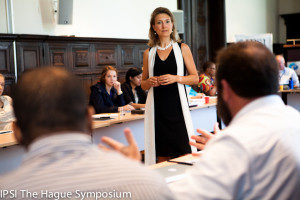by Joelle Thibault, Canada
Wednesday at The Hague symposium, the class went downtown to the Leiden University, where we joined our guest speaker Dov Jacobs. He is an Assistant Professor in International Law at the Grostius Centre. Jacobs explained to us the difference between retributive and restorative justice. He is a great speaker and answers honestly, which I really appreciated. He is a man with a lot of knowledge and he is not shy to share that knowledge. He also gave the class his point of view of the International Criminal Court and later on in the evening, in a Person 2 Person activity, several of us from the class viewed a video on the job of the Prosecutor of the International Criminal Court. It was a great chance to see another point of view for the ICC and also get to see behind the scenes of the court process. I truly would suggest the documentary, as it is quite informative. Dov Jacobs also has a blog, on which he discusses international law issues, called “Spreading the Jam”. He truly was an excellent guest speaker and I would love to attend a course of his at the University. It was a great experience going to Leiden University and getting to meet Dov Jacobs.
Friday, we were joined at the Clingendael institute by Dr. Valerie Rosoux. She is a senior research fellow  at the Belgian National Fund for Scientific Research (FNRS) and lecturer at the University of Louvain (Belgium). Dr. Rosoux was a fantastic guest speaker, who immediately got the attention of the whole class, but talking to us about reconciliation and memory. We discussed a lot among the class about truth and reconciliation councils and how they work. We also viewed a video talking about a truth and reconciliation that happened several years ago and showed what the process entailed in this particular situation. It was a really interesting video and gave some more information for those that were unsure of what a truth and reconciliation tribunal was. We had a lot of discussions about memory and how it takes a long time to readjust a memory in our mind (to try and forget and forgive) and how little things can make us remember a memory differently than someone else. For example, how a situation, like a robbery at a convenience store, can be remembered differently by three different people. Dr. Rosoux was so captivating and interesting during her presentation that I would love to attend one of her lectures at the University of Louvain.
at the Belgian National Fund for Scientific Research (FNRS) and lecturer at the University of Louvain (Belgium). Dr. Rosoux was a fantastic guest speaker, who immediately got the attention of the whole class, but talking to us about reconciliation and memory. We discussed a lot among the class about truth and reconciliation councils and how they work. We also viewed a video talking about a truth and reconciliation that happened several years ago and showed what the process entailed in this particular situation. It was a really interesting video and gave some more information for those that were unsure of what a truth and reconciliation tribunal was. We had a lot of discussions about memory and how it takes a long time to readjust a memory in our mind (to try and forget and forgive) and how little things can make us remember a memory differently than someone else. For example, how a situation, like a robbery at a convenience store, can be remembered differently by three different people. Dr. Rosoux was so captivating and interesting during her presentation that I would love to attend one of her lectures at the University of Louvain.

